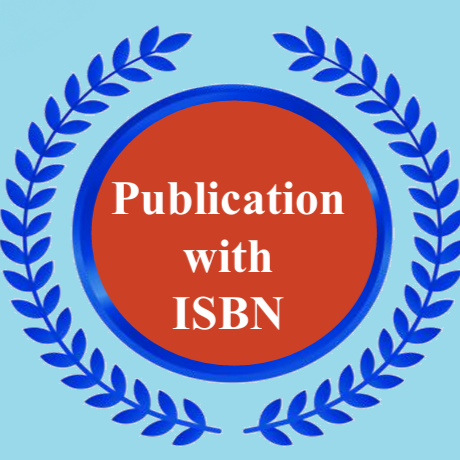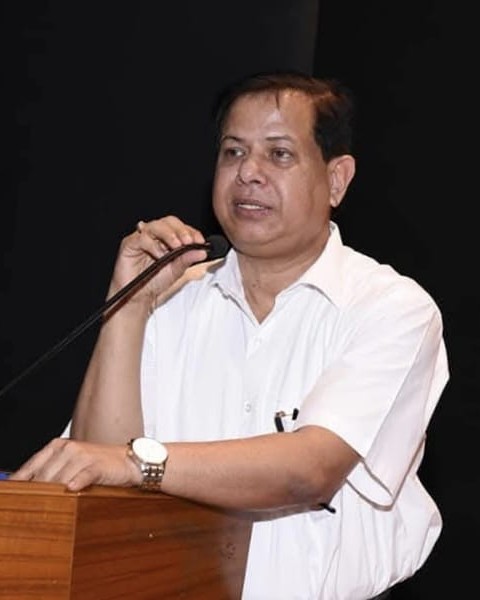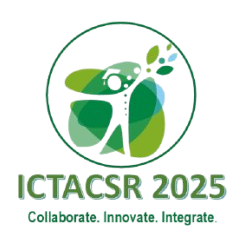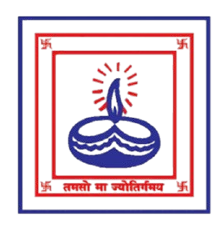















(ICTACSR 2025)
Organised by
Internal Quality Assurance Cell (IQAC), Cachar College, Silchar
6-8 November 2025
HYBRID MODE
Quick Links
Important Dates
Last Date of Abstract Submission
28 October 2025
Last Date of Registration
28 October 2025
Confirmation of Presentation Mode & Session
30 October 2025
Deadline for Camera-ready Submission of Full Paper for Book Chapter Publication with ISBN (Optional)
05 November 2025
Date of Conference
6-8 November 2025
Registration Fee

Registration Fee does not cover accommodation. Accommodation for outstation delegates can be arranged upon request at nearby Hotels on Payment Basis as per requirements. The registration fee includes only one certificate. If a co-author requires a presentation certificate, they must register and pay the fee individually.
International Conference on Transdisciplinary Approaches in Contemporary Scientific Research
6-8 November 2025
HYBRID MODE
Organised by
Internal Quality Assurance Cell (IQAC)
Cachar College, Silchar, Assam, India
Cachar College proudly announces its upcoming International Conference on “Transdisciplinary Approaches in Contemporary Scientific Research (ICTACSR 2025)”, an intellectually stimulating event that aims to explore the transformative power of transdisciplinary approaches in shaping the future of academic and applied research. In an era marked by rapid scientific advancements and global challenges—climate change, public health crises, artificial intelligence, and social inequality—the boundaries between traditional academic disciplines are becoming increasingly fluid. This seminar seeks to bring together scholars, researchers, industry professionals, and policy-makers from across the globe to foster dialogue, collaboration, and innovation that transcend disciplinary silos.
Cachar College, Silchar
Assam, India
Affiliated to Assam University, Silchar
Recognized under UGC Act 2(f) and 12(B)
Cachar College, established in 1960, stands as a premier institution of higher education in Southern Assam. Recognized under Sections 2(f) and 12(b) of the UGC Act, 1956 and affiliated to Assam University, the College offers Higher Secondary (HS) and Undergraduate (UG) programmes as per NEP 2020 across the disciplines of Arts, Science, and Commerce. With an impressive intake capacity of over three thousand students, the College serves as an educational hub for learners not only from the Barak Valley but also from the neighbouring states: Manipur, Mizoram, and Tripura. Its strategic location in the heart of Silchar ensures accessibility, while its sprawling campus, covering approximately six acres, provides an ideal setting for academic pursuit and personal growth. The institution comprises 17 academic departments, each dedicated to delivering quality education through innovative pedagogy and student-centric initiatives.
Presentation Mode
Oral Presentation (Offline)
Participants may choose to deliver an Oral Presentation (Offline) at the conference venue. Each presentation is allotted 15 minutes, including time for discussion.
Oral Presentation (Online)
Outstation participants may choose to present their work virtually/online. Each presentation is allotted 15 minutes, including time for discussion.
Poster Presentation
Participants attending the conference in offline mode may choose to present their work through a poster display measuring 36 inches (width) by 48 inches (height) in portrait orientation.
Theme of the Conference
Centered around the theme “Transdisciplinary Approaches in Contemporary Scientific Research,” the conference encourages participants to explore and engage with innovative perspectives that merge insights from the natural sciences, social sciences, humanities, and technology to tackle complex, real-world challenges. Other innovative and relevant topics aligning with the theme/subthemes are also welcome.
Innovations at the Interface of Life Science and Technology
Molecular Biology, Genetics, Microbiology, Toxicology, Neurobiology, Phytochemistry, Biochemistry, Fishery Science, Entomology, Stress Physiology, Gene Editing, Cancer Biology, Bioinformatics, Biotechnology, GMOs, Drug Designing, Taxonomy, Synthetic Biology, Biosensors, Pharmacology, etc
Innovations in Physical Sciences and Emerging Technologies
Nanotechnology, Green Chemistry, Synthetic Chemistry, Theoretical Chemistry, Material Chemistry, Quantum Science, Natural Products, Particle Physics, Astrophysics & Cosmology, Nuclear & Particle Physics, Condensed Matter & Material Science, High Energy Physics, Atmospheric Science, etc.
Mathematics, Computing and Artificial Intelligence (AI) as Scientific Catalysts
Number Theory, Algebra & Analysis, Algorithm, Statistics & Probability, Artificial Intelligence and Machine Learning, Quantum Computing and Mathematical Foundations, Data Science, Cryptography, etc.
Human-Nature Interactions and Biodiversity in a Changing World
Ecology, Biodiversity Conservation, Anthropology, Human-Wildlife Conflict, Deforestation and Land Use Change, Ecotourism, Urban Expansion, Restoration Ecology, Environment & Human Health.
Sustainable Development Goals (SDGs): Climate, Agriculture, and Innovation
Renewable Energy, Climate Change Mitigation, Urban Green Spaces, Environmental Science, Energy and Innovation, Organic Farming, Agro-ecology, Agriculture & Food Security, GIS and Remote Sensing, etc. .
Health, Wellness and Traditional Knowledge Systems (TKS)
Epidemiology, Zoonotic Diseases, Disease Diagnosis, Indian Knowledge Systems (IKS), Ethnobotany, Yoga & Sports, Stress Management, Nutrition & Lifestyle, Health Equity, Digital Detox, etc.
Social Science and Humanities in Scientific Innovation & Policy-making
IPR, Digital Transformation & Innovation, Industry 4.0 & 5.0, FinTech, MSMEs & Entrepreneurship, Agricultural Economics, International Economics, Gender, Diversity, & Inclusion in Scientific Innovation, Role of Ethics, Philosophy, Laws & Policy in Emerging Technologies, Sociotechnical Imaginaries, Humanities & Climate Policy, etc.
Award and Publication Opportunity



Best Research Work and Best Presentation in both Poster and Oral formats will be honored with Medals and Certificates of Appreciation. Also get a chance to publish selected full paper as book chapter in a edited book with ISBN.
BOOK CHAPTER PUBLICATION (OPTIONAL)
EMINENT SPEAKERS

Prof Sankar Kumar Ghosh
Former Vice Chancellor, University of Kalyani, WB Professor, Department of Biotechnology Assam University, Silchar, Assam, India

Padma Shri Recipient - 2020 Director, CCHRC, Silchar, Assam, India

Prof Maxim Khlopov
Director, Virtual Institute of Astroparticle Physics, Paris, France

Prof Mark L Lewis
Professor, Dept. of Mathematical Sciences Kent State University, Kent, USA

Prof. Ariela Burg
Department of Chemical Engineering, Sami Shamoon College of Engineering, Be’er-Sheva 8410802, Israel

Prof Dibyojyoti Bhattacharjee
Professor, Department of Statistics Assam University, Silchar, Assam, India

Prof Kalpana Bora
Professor, Department of Physics, Gauhati University, Guwahati, Assam, India

Dr Ramesh ‘Zimbo’ Boonratana
Conservation-Practitioner & Philanthropist Thailand

Dr Lopamudra Das Roy
Founder and President of Breast Cancer Hub Charlotte, North Carolina, USA

Dr Yashmin Choudhury
Associate Professor, Department of Biotechnology Assam University, Silchar, Assam, India

Dr Prakash Kanoo
Associate Professor, Special Centre for Nano Sciences (SCNS), JNU, New Delhi, India

Dr Dipesh Debnath
Principal Scientist, ICAR-National Academy of Agricultural Research Management, Hyderabad, India

Dr Shantanu Kundu
Assistant Professor, Pukyong National University, Busan, Republic of Korea

Dr Hridoy J. Mahanta
Scientist, Advanced Computing & Data Science Division, CSIR-NEIST, Assam, India

Prof Himadri Sekhar Das
Professor, Department of Physics Assam University, Silchar-11, Assam, India
Places to Explore







Barak Valley
Valley of Tea Estates
Discover the lush green charm of Barak
Valley, home to scenic tea estates stretching
across rolling hills. Walk through tranquil gardens,watch tea pluckers at work, and learn about traditional and modern tea processing.
Second Largest Wetland in Asia
Framed by hills on both
the east and west, this seasonal wetland
offers stunning views, especially with
the iconic Hizol trees that stand tall
through both dry and flooded seasons,
their half-submerged forms adding to the
charm. Sunrise and sunset here paint the
landscape in vivid colors, with the sun’s
rays dancing beautifully across the
water
Dimasa Kachari Kingdom
It is a historical and cultural landmark that once served as the capital of the Dimasa Kachari Kings, reflecting the region’s rich architectural and historical heritage.
Sepoy Mutiny- 1857
Malegarh is a historic site linked to the
Sepoy Mutiny of 1857. A fierce battle was
fought here, and many sepoys were
martyred in the struggle. The site holds a
mass grave of the fallen soldiers, marking
their sacrifice.
A Mughal Era Fort
Badarpur Fort, located in Karimganj district
along the banks of the Barak River, reflects
the historical era spanning the 14th to 17th
centuries. It stands as the only architectural
site in the Barak Valley bearing significance
from the Pre-Mughal to British periods.
Pilgrimage site
Bhuvan Tirtha is an important religious site situated atop Bhuvan Pahar, a hill in Cachar district. Dedicated to the Lord Shiva, the temple attracts countless pilgrims, especially during the festival of Shiva Ratri.
Constructed by Kachari King in 19th C
The Kanchakanti Temple was built in the year 1806 AD by a Kachari Ruler. According to local legend, the temple was constructed following a divine vision that instructed the king to establish a shrine where the combined power of Durga and Kali would be worshipped.


